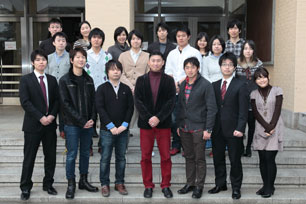Eisuke Yoshida, Professor, Faculty of Business and Commerce
Seeking how to manage organizations and utilize human resources
Last year, nine third-year students and nine fourth-year students were enrolled in my seminar class. Other than management accounting, we work on various themes related to business structure and organization design and management.

Unfortunately, it is hard to say that management accounting is a popular subject. Even within the Faculty of Business and Commerce, compared to glorious subjects such as strategic management or marketing theory, management accounting sounds difficult because it involves “accounting” and gloomy because it involves “management”, so although they know it is important, students tend to avoid it like the plague.
Also in business management, compared to more glamorous divisions such as product planning and development or sales, divisions that are deeply related to management accounting may have a stiff image, such as business planning, human resources, and accounting.
However, the high cost competitiveness and strategic implementation capabilities achieved as a result of practicing good management accounting are very important as a source of competitive advantage for a business.
To begin with, the term management accounting is difficult to understand. As a business grows bigger, it becomes difficult for the president to manage the company alone, and it becomes necessary to put someone else in charge of certain matters, to nurture human resources, to plan budgets, and to evaluate results. The system that covers these issues is management accounting. In other words, I consider the role of management accounting to be seeking solutions to problems such as unfairness in workloads, frustration over performance evaluation, inefficient and wasteful business practices, and difficulty in balancing cost and quality.
In my seminar class, I try not to cram management accounting into students’ heads, but focus on creating a place for students to learn for themselves. Also because management accounting is a study which explores how to manage organizations and utilize human resources, I place importance on autonomy and interaction with others.
As for our actual activities, I choose different approaches every year, deciding on them through discussions with students. Our activities include individual research, group research, commentary on current topics, research presentation with a seminar class of another university, factory tours, and other projects that are brought in by my students.
As a person who has lived longer, it is my true desire to be able to help students learn more about themselves and about others, so they can be prepared to go out into the world to find their own happiness.
Student's Voice
Mizuki Sawamura, Fourth-year Student,
Faculty of Business and Commerce
Hello, this is Professor Yoshida’s seminar class!
Our seminar class has a cozy atmosphere, with a total of nine third- and nine fourth-year students. Every time, someone is assigned to do a presentation, and we all exchange opinions on the issue. The class normally has a friendly atmosphere, but this is the time when we hold active debates in which we speak out frankly.
Prof. Yoshida works closely with students and really cares about each one of us. Also, he truly understands the characteristics of each student. His accurate and clear advice prompts us to grow not only intellectually, but also as human beings.
I really appreciate being able to lead a fulfilling academic life through this seminar class, surrounded by an amazing professor and wonderful senior students and peers.
*Position titles, etc., are those at the time of publishing.
